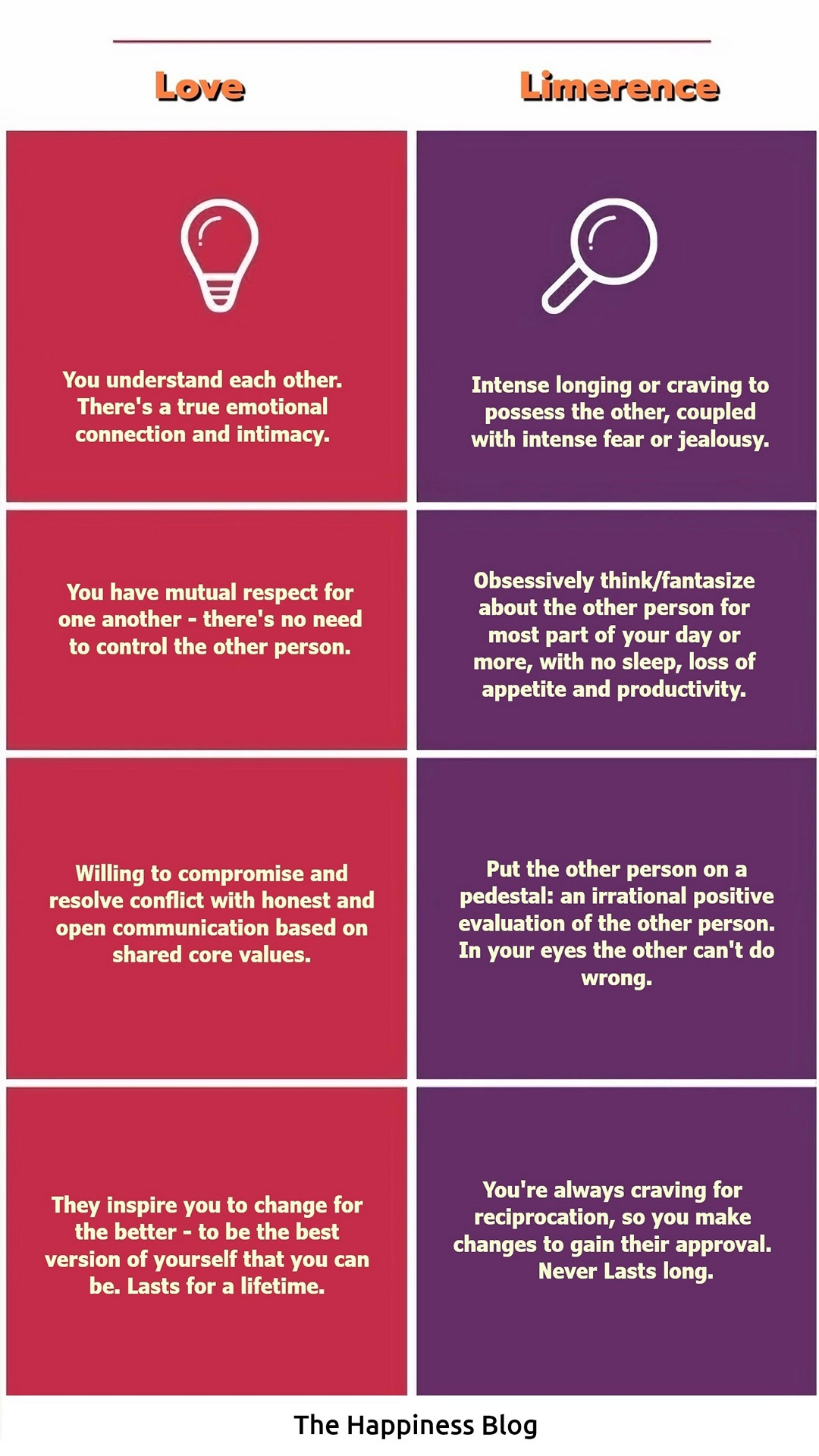Today's Monday • 10 mins read
Love and limerence are sometimes used interchangeably, but they are not the same.
- Love involves deep affection, caring, and intimacy.
- While limerence is an intense, obsessive infatuation that seems like love, but isn’t.
The term “limerence” was coined by psychologist Dorothy Tennov to describe an intense and obsessive form of romantic attraction.
People going through limerence may act in risky or impulsive ways to win the target person’s attention and affection. Also, when they are devastated because the relationship didn’t work out.
Love versus Limerence: What Are The Differences?
Love and limerence are two very different types of relationships.
Love is a healthy foundation for a lasting relationship, while limerence is a disruptive force that can lead to irrational and harmful behaviors.
| Love | Limerence | |
| Focus | On the other person’s needs. Based on a deep emotional connection and genuine care for another person. | On the self and the desire to be with the other person. Based on intense infatuation and obsession with someone. |
| Duration | Long-term. Develops gradually over time and is often accompanied by a sense of comfort and security. A deep, lasting bond that can withstand challenges and changes over time. | Short-term, intense. Develops quickly and often feels like a rollercoaster of emotions. Can burn out quickly and often ends with the limerent person feeling rejected or disillusioned. |
| Reality | Grounded in reality and acceptance of flaws. Involves a willingness to compromise and work through challenges. Involves seeing the other person as a whole, a complex person with strengths and weaknesses. | Illusory and idealized, based on fantasy and projection. Often involves a sense of entitlement and a desire to possess the object of affection. Involves putting the other person on a pedestal and idealizing them. |
| Reciprocity | Mutual. Involves a sense of shared experiences and mutual growth. Can involve some level of sacrifice and selflessness. | Unrequited or one-sided. Often involves a sense of one-sidedness, with the limerent person doing most of the emotional heavy lifting, focused on their own desires and needs. |
| Attraction | Can involve physical attraction, but is not solely based on it | Often based heavily on physical attraction and a desire for sexual or romantic fulfillment. |
| Emotions | Stable and consistent. Can be both emotionally and mentally fulfilling. | Intense and fluctuating. Can be emotionally overwhelming and mentally fatiguing. |
In a healthy, loving relationship, both people are committed to each other and work to overcome hurdles together. They share a strong bond of trust and respect and support each other in good and bad times.
Limerence, in contrast, can create a superficial relationship centered on physical attraction and infatuation. The person in limerence may be more occupied with being with the other person than actually being with the person.
They may also be more likely to get into risky behaviors, like cheating or chasing many partners at the same time.

How To Know The Signs of Limerence
Limerence may feel like love in the early stages of a relationship. However, here are the signs to identify limerence:
- Intensity: Limerence consists of intense, uncontrollable, and irrational feelings of desire, while love is characterized by a deeper, more rational, and more manageable feelings.
- Reciprocation: Limerence is often almost blindly focused on emotional reciprocation from the target person. While love is focused on a gradual build-up of intimacy and sharing, a respect for the other person’s boundaries, and keeping a spirit of acceptance of their decision (to reciprocate love or not).
- Intrusiveness: Limerence is marked by intrusive thinking and a constant preoccupation with the object of desire, to the point of helpless obsession. Love in early stages may have intrusive thinking and constant attention, but it does not cross over to being an obsession.
- Time frame: Limerence is short-lived (lasting only a few weeks or months), and can appear and end abruptly and intensely. While love develops steadily over time and is enduring and can last a lifetime.
- Emotional Intensity: Limerence is generally defined by an overwhelming intensity of feeling, whereas love is defined by a more balanced mix of positive and negative emotions.
- Focus: Limerence is usually focused on the other person, whereas love is more balanced in its focus on both the self and the other person.
- Sense of Commitment: Love is frequently associated with a sense of commitment and obligation to the other person. Whereas limerence is more centered on the want to be with the other person.
- Realism: Love tends to be more grounded in reality, while limerence can be characterized by idealization and a lack of realistic thinking.
The Essence of Limerence
Limerence is an involuntary state often marked by intense longing, a desire for emotional reciprocation, and intrusive thinking.
People in limerence may feel elated one moment and deeply depressed the next, depending on how their object of affection is responding to them. People in a state of limerence may become obsessed with someone who does not reciprocate their feelings, leading to feelings of rejection and despair.
In a way, it is a strong infatuation that may be mistaken for heady love. Limerence is not sustainable over the long term, however intense or overwhelming it is.
It typically lasts anywhere from a few months to a few years. Then it fades away, often leaving the infatuated person disillusioned and emotionally empty.
Unlike love, limerence comes with a sense of urgency and desperation to be with the person of desire. A limerent person may have physiological symptoms like increased heart rate, sweating, and nervousness.
Limerence is a state of mind characterized by an intense infatuation or obsession with another person.
People who experience limerence often report feeling a strong desire for emotional or physical connection with their object of affection, and may become preoccupied with thoughts of them.
Limerence can be highly intense and all-consuming, leading to feelings of anxiety, jealousy, and even despair. People in a state of limerence may engage in compulsive behaviors, such as constantly checking their phone for messages or stalking their object of affection on social media.
While limerence is commonly confused with romantic love, the two are not the same.
Limerence is marked by intense emotions and physical attraction, but love is defined by a deeper, more enduring emotional connection that may or may not involve physical attraction.
Limerence can happen with celebrities, coworkers, or anyone who arouses strong desires. However, the most intense form of limerence is often seen when one is seeking love.
Limerence in romantic relationships can create deep emotional distress out of person-obsession.

In limerence,
- You are infatuated with someone you barely know or have just met.
- You have an idealized view of the person and ignore any flaws or negative traits.
- You are more concerned with the idea of being with the person than with the actual person themselves.
- You may engage in risky behaviors, such as cheating or pursuing multiple partners at once.
- If you are experiencing limerence, it is essential to understand that it is not sustainable over the long term. Eventually, the intense infatuation will fade away, leaving you feeling empty and disillusioned. It is important to take the time to get to know the person you are interested in and to build a foundation of trust and respect before committing to a long-term relationship.
The Essence of Love
Love is a complex emotion defined by attachment, care, and intimacy. It has two people sharing a deep sense of connection, understanding, warmth, and contentment. Unlike limerence, love is marked by patience and support for the other person, not urgency and desperation.
People in love strike a balance between their own and their partner’s well-being, working to keep the relationship going. Although not as intense as limerence, love offers a meaningful and transformative connection that endures over time.
Love is a deeper, more enduring emotion founded on trust, respect, and emotional connection. Limerence, on the other hand, is typically motivated by physical attraction or a desire for validation and attention.
Love is characterized by a sense of calm and stability, while limerence is often characterized by intense emotions and mood swings.
Love involves a sense of mutuality and reciprocity, while limerence is often one-sided.
In love,
- You feel a sense of security and stability in your relationship.
- You are committed to your partner and willing to work through any challenges.
- You feel a deep emotional connection to your partner that has developed over time.
- You are able to see your partner’s flaws and imperfections and still love them for who they are.
How To Identify Love
Love can take on various forms and expressions depending on the person and the relationship. However, there are certain key characteristics of love worth noting:
- Affection: A deep affection for the other person is the hallmark of love. This may be expressed in many ways, like physical touch, verbal affirmations, or acts of kindness and care.
- Intimacy: Love is marked by a sense of intimacy and connection that is not always physical. It rather involves a feeling of closeness and emotional vulnerability that allows both people to share their thoughts, feelings, and desires with one another.
- Mutual understanding: Love is built on a foundation of mutual understanding and mutual respect. This involves a deep appreciation for each other’s values, beliefs, and aspirations. It also means revealing one’s vulnerabilities without fear.
- Commitment: Love often implies a sense of commitment to the other person, whether through a formal commitment like marriage or a long-term relationship, or through a shared sense of dedication and loyalty.
Negative Effects of Limerence on Relationships
Limerence can be a thrilling and exciting experience. But, it can also have negative consequences on relationships, causing stress, anxiety, and conflicts.
Those in limerence often have an intense desire for emotional reciprocation. This puts undue pressure on the other person and often leads to conflicts.
The limerent person may also become so preoccupied with the object of affection that they neglect their work or personal hygiene.
Limerence is an intense feeling of infatuation or obsession with someone, often characterized by irrational thoughts and compulsive actions. The irrationality is often detrimental to the relationship.
People in limerence may also experience anxiety, jealousy, and depression, particularly if the object of affection does not reciprocate their feelings. It can consume their thoughts and lead to a decline in mental and emotional well-being.
Can limerence turn into love over time?
Limerence can turn into love if the two people involved build a genuine emotional connection towards each other, beyond the initial infatuation. That said, limerence is not love to start with, and so, there’s no guarantee it can turn into a healthy, lasting relationship.
How to Build Healthier Relationships
Here are some pointers for building more meaningful connections:
- Rather than physical appeal or validation, prioritize emotional connection and trust.
- Employ effective communication skills, such as active listening and open, honest dialogue.
- Be willing to compromise and collaborate in order to develop solutions that benefit both of you.
- Establish and keep to boundaries, especially if the other person makes you feel at ease with their nosiness.
If you’re in limerence, keep your expectations real. Don’t waste your time trying to convince your target to fall in love with you. It may be wiser to invest in someone who works with you to build a strong core of trust, mutual respect, and genuine love.
Final Words
Here are 3 take-home messages:
- Love is a choice that requires time and commitment to work through any challenges that may arise. It is more profound and stable than limerence.
- Limerence is a sudden and intense infatuation that can border on obsession, leading people to idealize the object of their affection and overlook their flaws and negative traits.
- Always approach any new relationship with realistic expectations and take the time to build a strong foundation based on trust, mutual respect, and genuine affection.
√ Also Read: Here Are 10 Signs That Your Limerence Is Ending…
√ Please spread the word if you found this helpful.
• Our Story!
